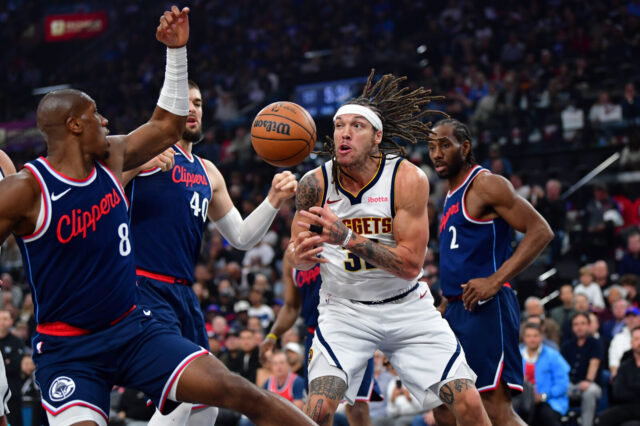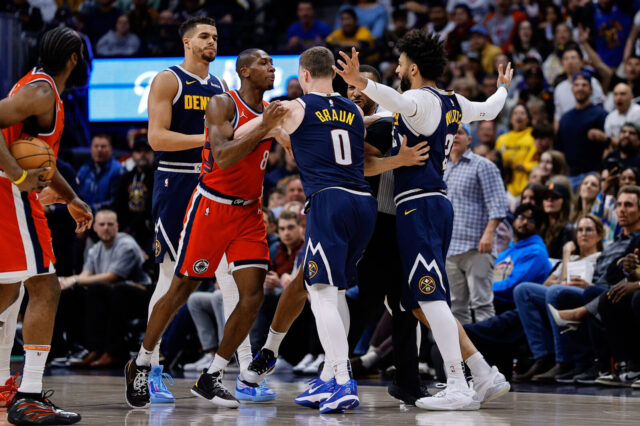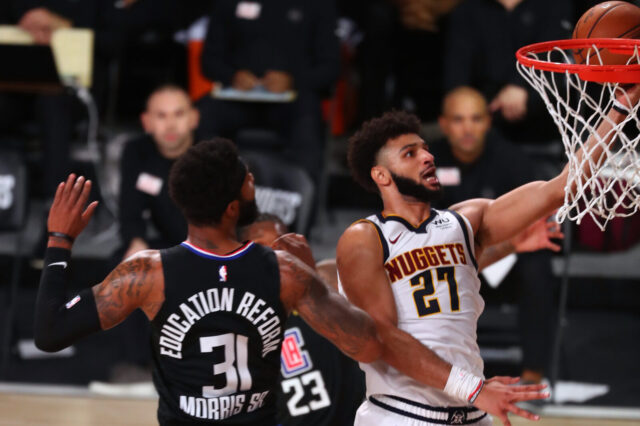Is everyone feeling better after the Nuggets drubbed the 5-1 Miami Heat on Tuesday night? I know I am. So good, in fact, that I’m ready to push aside many of my concerns about the funky 5-2 start and give this group the benefit of many doubts. Here are a few things that could worry me if I wasn’t in such an optimistic mood.
Jokic’s bizarre start
Much has been written already this season about Nikola Jokic’s slow start. So much so that his teammates had to defend him after back-to-back losses where he averaged 7 shots and then an uneven performance in Orlando. We’ve been hearing a lot of “he’ll be fine” and “there is a lot of blame to go around” stuff from his teammates (which is what they should be saying).
But Jokic’s struggles are not a media creation. In an article in the Denver Post on Monday, his best friend on the team, Juancho Hernangomez, admitted Nikola “ knows he’s not playing that good.”
“Bottom line […] Nikola’s gotta be more aggressive.”
“Bottom line,” said Coach Mike Malone, “Nikola’s gotta be more aggressive.” Then he added: “We’ve talked about it.”
It seems like the pressure is counterproductive, though. At times, you can almost see the spite in Jokic’s body language as he chucks a three early in the shot clock, presumably because Malone just told him to get more aggressive. At other times, he seems overwhelmed by the lack of ball movement or an errant pass. What’s more, the whistles are not going his way, for whatever reason, which has prevented him from developing any kind of rhythm. It’s been a slog.
And yet … Jokic is averaging ~15 points, 10 rebounds, and 6 assists, which is good for a 6.1 +/- to go along with a better defensive rating than he had a year ago. True, these aren’t the offensive numbers we’ve become accustomed to, and his body language looks so awful so much of the time. But as bad as things have gone by superstar standards, Jokic is still having an important and positive impact on games.
So it’s definitely not time to panic … yet. The team is 5-2. The other stars on the team have his back. And the Joker has had weird stretches of passive play and foul temperaments before. None of this is particularly new. But the longer this slump lingers, the harder it will be for Jokic to regain the championship form he had in the playoffs last year. Everyone around him knows he has that level somewhere. But how long until we see it, and what will the Nuggets have lost in the meantime?
Will Barton as the starting small forward
There are legitimate concerns about whether Barton can guard the big small forwards and shooting guards among the elite Western Conference contenders. Since there is nothing Thrill can do about his height and size, those question won’t totally go away until we see how the season unfolds.
But so far, Barton has been possibly the Nuggets’ best player. According to plus-minus, at least, he has been far and away their best player. His 11.2+/- is almost double that of Jokic and Murray. Barton is also shooting 50% from three and averaging 7 boards, which would be a career high if he keeps it up, to go along with 14.2 PPG. His defensive effort, too, has been a big part of the Nuggets’ top-12 defensive rating. In fact, he’s the only Nugget averaging over one steal and one block per game. Will is getting it done.
Can he keep up this production for 82 games? Can he be productive against all the 6’8-’10 guards and small forwards sprinkled around the conference? Can he be a key contributor in crunch time of big games within the flow of the offense?
Stay tuned. The early returns are promising, though.
The bench
Other than Jokic’s funk, the bench has been the biggest disappointment so far. They’ve been bad. As of November 6th, they have a net rating of -4.5, which places them in sole possession of 27th place in the league. The quartet of Monte Morris, Malik Beasley, Mason Plumlee, and Jerami Grant have a combined -11.8 +/-, which pretty well matches up to the eye test.
This is not something Nuggets’ fans anticipated. Going into the season, the bench seemed like one of the team’s main strengths. Not only were they deep, but they were talented and would benefit from continuity and the experience of a deep playoff run. That’s what I argued, at least. So why have they been so disappointing?
In a word, shooting. Of the three primary scorers off the bench, only Grant is shooting over 40% from the field, but close to half of his shots come from three where he is hitting just 24%. Monte Morris is shooting 38% from the field, which is actually marginally better than Beasley’s 36.4%. This unit has struggled since leaving Portland in the first game of the year. They’ve struggled to space the floor, to get open looks, and to knock down the good looks that they do get.
However … let’s give them a bit more time before we trade away the whole lot for Andre Iguodala. This is such a young group. The old man in the rotation is Plumlee, who has been solid on both ends. Monte and Malik are basically playing in their second year, and Grant is only 25 and still finding his footing on a new team. There’s also a silver lining in the shooting numbers: Morris and Beasley are both hitting from distance: 50% and 41.4%, respectively. Last year for the Thunder, Grant shot nearly 40% from three. So the shooting should come around in time.
If it doesn’t, there is probably someone else on the bench who could provide shot creation, floor spacing, and rebounding, if the bench needs reinforcements. Hypothetically.
Malone’s handling of MPJ
If you’re anything like me, I’m sorry for you. But that would also mean you thought that maybe, just maybe, once Malone put Michael Porter Jr. into the rotation, he would stay there for good. Unfortunately for all of us likeminded people, that has not happened—as evidenced by the DNPs and the garbage time minutes he was given on Tuesday—so we are left to villainize poor Torrey Craig for no other reason than that he’s not MPJ.
But look, this is probably the right move for now. It pains me to write it. In fact, I can’t believe I am writing it. But easing rookies into the rotation in blowouts and after injuries has been the M.O. of this coaching staff, and I get why they may want to handle that back with kid gloves for awhile. Making rookies “earn it” probably makes the veterans happy, too. It just doesn’t make me happy, which is important to me but probably not to Coach Malone.
So … I’m willing to support this decision, temporarily. I am choosing to trust in the coaches to bring along another talented player because they have earned that trust. But this rope is short. I’m not sure how many times I can watch Craig’s man double Jokic and Murray with impunity before I am overcome by frustration and melt down on Twitter. In the meantime, I will keep rooting for blowouts and stay patient, following the good example of MPJ himself.
The Philadelphia 76ers
Friday night’s game is a good early season test, but the outcome isn’t going to tell us a whole lot, frankly. The Sixers are good—potentially championship good—and the Nuggets have been the most inconsistent and shaky 5-2 team in the history of the NBA that I can remember in this moment.
So … no outcome will surprise me. The Nuggets could easily get beaten up by a long and talented Philly squad; they could also shoot the lights out of the Pepsi Center the way they did against the Heat on Tuesday and run Embiid off the floor. Regardless of what happens, though, wins and losses are far less important right now than the trends and habits the Nuggets are developing, and I think those arrows are pointing in the right direction. If that continues, I’m not concerned with the final score on Friday.
(I mean, unless Jokic shoots like 1-for-9 and fouls out in the fourth, after which Barton goes hero baller only to be replaced by an ice cold Torrey Craig who has to listen to MPJ chants after two bricked threes in crunch time.)
Crap. Now I am worried—about all of it.


